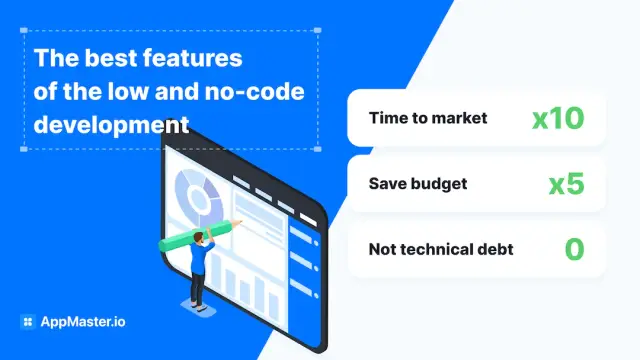Integrating AI in App Development: How App Creating Websites are Adapting
Explore the integration of AI in app development and how no-code and low-code platforms are adapting for AI implementation. Learn about the benefits and challenges faced in the use of AI in app development platforms.

Rising Popularity of No-Code and Low-Code Platforms
No-code and low-code app development platforms have gained significant traction recently, offering a more efficient, user-friendly, and cost-effective way to build web, mobile, and backend applications. These platforms are designed to expedite the development process while minimizing the requirement for traditional code-writing or extensive programming knowledge.
By enabling users to create applications with visual drag-and-drop interfaces, visual data modeling and pre-built templates, no-code and low-code platforms cater to a wide range of users, from professional developers to non-technical citizens or business users. This has democratized the app development process, making it more accessible to a broader audience.
An excellent example of a powerful no-code platform is AppMaster. AppMaster allows customers to build backend, web, and mobile applications using a visual interface. By providing extensive data modeling and business logic tools, the platform automatically generates source code and deploys applications, ensuring an efficient and scalable development process. This platform's focus on automation and user experience makes it ideal for businesses and developers seeking a contemporary solution.

Integrating AI into App Development
As businesses evolve in the digital era, there is an increasing need for integrating artificial intelligence (AI) functionalities into the app development process. App creators are adapting to this demand by incorporating pre-built AI models, customizing AI models, or embedding AI-powered components directly into the applications functionality.
Several development platforms now offer AI integration capabilities, including no-code and low-code tools. These features improve the functionality and performance of applications and elevate the quality of end-users' experience. AI integration offers numerous potential applications, including smart recommendations, advanced analytics, natural language processing, machine learning models, and more. Integrating AI in app development platforms typically involves four essential steps:
- Identifying the AI use case: Determine the desired AI capabilities, such as personalized recommendations, advanced analytics, or sentiment analysis. This involves identifying the intended audience and understanding their needs to choose the most appropriate AI-based features.
- Selecting an appropriate AI model: Based on the use case, it's crucial to choose the right AI model for the job. This could include pre-built AI models, custom AI models, or AI-powered components that can be embedded directly into the application.
- Preparing and managing data: AI models require large datasets for learning and training. Proper data management and preprocessing are essential to ensure accuracy and reliability of the AI implementation.
- Refining and optimizing the AI model: Continual monitoring and fine-tuning of AI functionality are vital for optimal performance and adapting to changing end-user requirements.
Benefits of AI in App Development
The integration of AI in app development brings a multitude of benefits for both developers and end-users. Here are some key advantages of using AI in app development:
- Improved User Experience: AI-powered applications can enhance the user experience by offering personalized content, smart recommendations, and adaptive interfaces. Machine learning algorithms analyze user behavior to deliver content tailored to individual preferences, resulting in a more engaging and satisfying user journey.
- Automation of Repetitive Tasks: With the help of AI, developers can automate various routine tasks, such as data entry, data validation, and notifications. This saves time, accelerates the development process, and reduces the risk of human error.
- Enhanced Data Analysis and Decision Making: AI-driven analytics provide valuable insights by identifying patterns and trends in large datasets. This enables developers and businesses to make informed decisions and optimize their app's performance based on real-time and historical data.
- Highly Personalized Content: Thanks to AI, apps can deliver highly personalized content and user experiences. By leveraging user data and machine learning algorithms, apps can offer recommendations and content tailored to each user’s preferences, further enhancing the user experience.
- Proactive Support and Assistance: Integrating AI-powered chatbots and virtual assistants into apps can improve customer support, provide personalized guidance and resolve user queries more efficiently. Using AI in customer support channels reduces response time and ensures a more satisfying experience for users.
AI integration continues transforming the app development industry from improved user experience and automation to personalized content and enhanced data analysis. As no-code and low-code platforms adapt to the implementation of AI, developers can leverage these benefits for a more streamlined and efficient app creation process. Moreover, as these platforms become more user-friendly and accessible, AI integration will empower non-technical users to harness the full potential of AI in their app development endeavors.
Challenges Faced in AI Integration
Integrating AI into app development platforms has become a popular trend, but it has challenges. Several key obstacles must be addressed when adding AI capabilities to no-code or low-code app development.
Data Complexity
Managing and processing complex data is a major challenge in AI integration. AI models often require large volumes of the data to produce accurate results, and challenges arise in obtaining, storing, and processing this data. In addition, data must be properly cleaned and structured to be fed into AI models. Ensuring data consistency and accuracy is essential for maintaining the quality of AI-powered features within an app.
Finding Suitable AI Models
Selecting an appropriate AI model for specific applications is crucial for effective AI implementation. Developers have to consider the compatibility of AI models with the problem they are trying to solve and the constraints imposed by the existing development platform. Moreover, developers must be skilled in choosing and configuring the right AI models, a task that can be daunting for those unfamiliar with AI research.
Privacy Concerns
As AI models rely on large quantities of data, privacy concerns and regulations have become increasingly important. Developers must ensure that their applications adhere to data protection standards and that sensitive user information is not compromised when implementing AI features. This requires careful consideration of data storage and access and transparency in how data is used within AI models.
Integration with Existing Frameworks
Seamlessly integrating AI components with existing no-code and low-code platforms is another challenge. Developers must ensure that the AI models can work effectively with the tools, services, and libraries used within the platform, without causing conflicts or hindering the existing functions and features. Building a comprehensive solution that bridges the gap between AI models and these platforms is essential for successful integration.
Cost of AI Implementation
Finally, the cost of implementing AI features can be significant, especially for smaller development teams working with limited budgets. Developers must carefully assess the cost-effectiveness of AI solutions, considering the initial investment in AI tools and resources, as well as the ongoing maintenance and support requirements. Striking a balance between the potential benefits of AI and the cost of deployment is essential in making informed decisions during integration.
AppMaster and AI: Seamless Integration Capabilities
AppMaster, a no-code platform for developing backend, web, and mobile applications, has addressed many of the challenges associated with AI integration. Its powerful platform allows users to create complex applications quickly and efficiently by leveraging AI-powered components or services with minimal effort. AppMaster’s visual Business Process (BP) Designer simplifies AI implementation by offering streamlined, user-friendly tools for creating and managing AI capabilities within applications. Using BP Designer, developers can effortlessly incorporate AI components into their applications, modifying them as needed to suit specific use cases.
The flexible API offered by AppMaster also facilitates seamless AI integration. Developers can connect various AI services and libraries directly into the application's backend, enabling advanced AI-powered features and capabilities. Backend applications generated by AppMaster are efficient, scalable, and compatible with a wide range of AI solutions, making it easier for developers to leverage AI for enhancing app functionality and user experience.
AppMaster’s commitment to providing a comprehensive and powerful development platform has positioned it as a leading tool for integrating AI into no-code and low-code app development. Its approach to simplifying the process, enabling seamless integration, and supporting a wide range of AI solutions make it a top choice for developers looking to create AI-powered applications.
Future of AI in App Development Platforms
As AI continues to evolve and significantly impact app development, no-code and low-code platforms are expected to adapt, offering even greater support for AI implementation. Some key trends that are anticipated to gain momentum in the future include:
Widespread Adoption of AI Features
The demand for AI-powered application features is expected to grow in the coming years. As a result, more app development platforms will prioritize integrating AI components and services to enable developers to implement AI-enhanced functionality with ease and efficiency. This widespread adoption of AI will make it increasingly necessary for app development platforms to provide strong support for AI integration.
Better Support for AI Integration
As app development platforms recognize the value of enabling AI capabilities, they will likely invest more resources in providing better support for AI integration. This includes improving existing tools, libraries, and APIs that facilitate AI implementation, making it easier for developers to harness AI technologies and add AI-enhanced features to their apps without extensive programming or coding expertise.
Accessible AI Tools for Citizen Developers
Future AI integration in app development platforms is predicted to extend the accessibility of AI tools and capabilities to a wider audience – not just professional developers, but also citizen developers. This democratization of AI will empower individuals and businesses to implement AI-enhanced functionality in their applications without the need for specialized AI knowledge or coding skills. By making AI tools easily accessible and user-friendly, app development platforms will continue to drive innovation and growth in AI-enhanced app development.
FAQ
No-code and low-code app development platforms are software tools that enable users to quickly build web, mobile, and backend applications with minimal programming or code-writing requirements.
AI can be integrated into app development through various methods, such as using prebuilt AI models, customizing AI models, or embedding AI-powered components directly into the app's functionality.
Some benefits of using AI in app development include improving user experience, automating repetitive tasks, enhancing data analysis and decision-making, and enabling highly personalized content for users.
Challenges of integrating AI in app creating websites include finding suitable AI models, managing complex data, addressing privacy concerns, ensuring seamless integration with existing frameworks, and handling the cost of AI implementation.
The AppMaster platform facilitates AI integration through its visual Business Process (BP) Designer, flexible API, and support for backend applications, offering seamless AI implementation capabilities for improving app functionality and user experience.
Future AI trends in app development include more widespread adoption of AI features, better support for AI integration in development platforms, and more accessible AI tools that empower citizen developers to implement AI capabilities in their applications.






